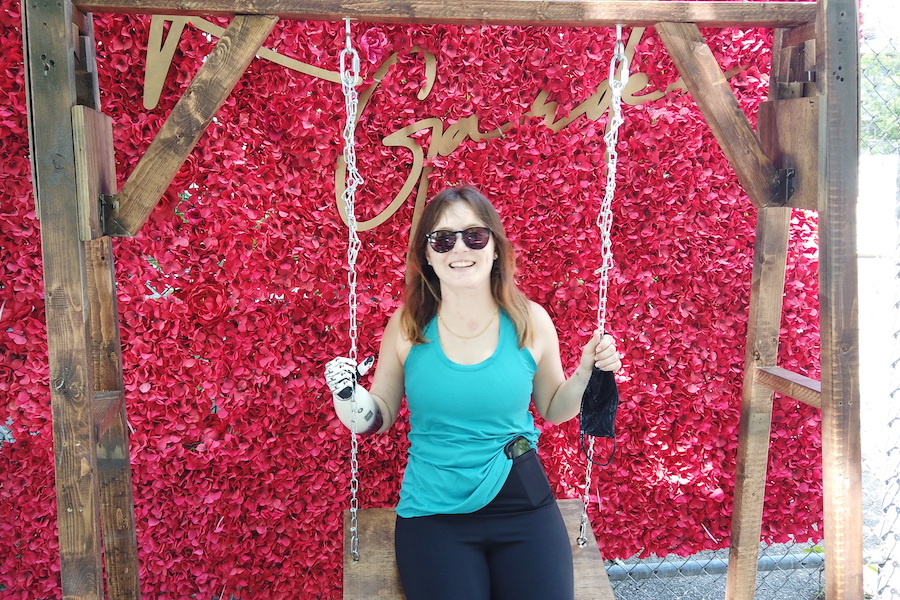The benefits of owning a pet are well-known. The emotional support that a dog or cat (or other pet!) provides can be very helpful, especially when someone is going through the aftermath of an amputation. But being a pet owner isn’t always easy! The responsibilities can be overwhelming, especially if you’re navigating this two-handed world with only one hand or no hands. Let’s look at those challenges before we go over the sweet side of owning a pet.
Weightlifting
It may be your pet that’s heavy or it may be the bags of pet food or kitty litter! Either way, make sure your prosthesis can handle that extra weight. Our on-site clinical therapy specialists work with each patient, helping them figure out how to handle their daily tasks. If lifting a heavy animal or a heavy bag is something they do regularly, we’re going to teach them the best way to do it using their prosthesis. The ideal type of prosthesis, be it body-powered, myoelectric or activity-specific, will depend on the type of task you need to do, so be sure to talk it over with your prosthetic care team. You may also need to strengthen your residual limb to help with these heavier tasks.
Gentle Handling
Some myoelectric terminal devices offer very strong grips. You should be sure to tell your prosthetist that you have a pet and how much you handle them. Some myoelectric devices can be calibrated to lower the grip strength so that you don't end up accidentally hurting your pet. Others cannot be calibrated and there is a possibility you could hurt your pet, so it's important to discuss how to pick up, hold or carry your pet with your prosthetist. Keep in mind that if you’re fatigued, the control you have to open and close your device is diminished. In addition, when you’re fatigued, you may not want to pick up your pet with your affected arm. A lack of strength could result in a dropped pet, and nobody wants that to happen!
Tugging
While you want to be gentle with your pet, your pet may not be gentle with you! When large dogs pull on their leashes, that might be tough on your socket, depending on the type of socket you have. Additionally, some terminal devices can't take the large amount of pressure that a pulled leash could result in. Be sure to discuss these stresses with your prosthetist or clinical therapy specialist. Our patient Lynda found that after her accident that resulted in a partial hand amputation, she had a hard time being around her large dogs because she was worried they would hurt her sensitive residual hand. After receiving her prosthesis, Lynda found that the protection it provided allowed her to use both her hands frequently when handling her pups.
Support
In our article “Five Resources That Help You Build A Strong Circle of Support,” fellow writer Sherri Edge wrote about how pets can provide emotional support in the time after an amputation or for anyone at any time: “Pets are also great companions. Just being near a dog, cat or other pet can be soothing and uplifting. Recent studies link pet ownership to lower blood pressure, reduced stress and lower rates of heart disease.”
Exercise
If you’re a dog person, your pet can help you stay in shape with daily walks, runs or visits to the park to play frisbee or chase balls. There’s also the added benefit of getting outside, which can be mood elevating and increase your vitamin D. We know that for many dogs, when their owner starts lacing up their shoes, they head to the front door and wait to be leashed.
Plenty of our patients are pet owners and we’ve been lucky enough to meet a few of those awesome pets. Do you think a new prosthesis could help with your responsibilities as a pet owner? Please contact us to schedule a complimentary consultation. Do you have any advice for your pet loving peers? Please leave it in the comments below. Thanks for reading and love on those pets of yours for us!





%20President%20and%20Senior%20Clinical%20Director.jpg?width=600&height=600&name=John%20M.%20Miguelez%2c%20CP%2c%20FAAOP(D)%20President%20and%20Senior%20Clinical%20Director.jpg)










No Comments Yet
Let us know what you think